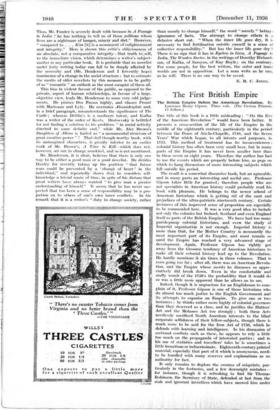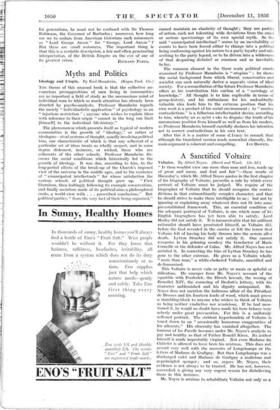- The First British Empire
The British Empire Before the American Revolution. By Lawrence Henry Gipson. Three vols. (The Caxton Printers. 15 dollars.)
Tux title of this book is a little misleading; "On the Eve of the American Revolution" would have been better. It presents a cross-section of the life of the Empire in the middle of the eighteenth century, particularly in the period between the Peace of Aix-la-Chapelle, 1748, and the Seven Years' War which began, to all intents and purposes, in 1755. This method of treatment has its inconveniences : colonial history has often been very small beer, but in many parts of the Empire it has never been smaller beer than in these seven or eight years. Therefore the author has had to use the events which are properly before him, as pegs on which to hang discussions of more interesting subjects which fall outside his period. -
The result is a somewhat discursive book, but an agreeable, and in many parts an interesting and useful one. Professor Gipson takes little for granted ; therefore people who are not specialists in American history could probably read his book with pleasure. He belongs to the newer school of American historians which is getting rid of the .cant and prejudices of the ultra-patriotic nineteenth century. Certain instances of this improved sense of proportion are especially to be commended here. It was a very good idea to include not only the colonies but Ireland, Scotland and even England itself as parts of the British Empire. We have had too many parish-pump colonial historians, and even the study of Imperial organisation is . not enough. Imperial history is more than that, for the Mother Country is necessarily the most important part of its Empire, and must remain so until the Empire his reached a very advanced stage of development. Again, Professor Gipson has rightly got away from the tiresome tendency of American historians to make all their colonial history lead up to the Revolution. lie hardly mentions it six times in three volumes. That is even going too_ far ; after all, there was an American Revolu- tion, and the Empire whose merits he discusses so appre- ciatively did break down. Even in the comfortable and stuffy womb of the 1750's the probability that it would do so was a little more apparent than he allows .us to see.
Indeed, though it is ungracious for an Englishman to com- plain of it, Professor Gipson is one of those historians who do almost too much justice to the English Government and its attempts to organise an Empire.- To give one or two instances : he thittics rather more highly of colonial governors than they deserved as a class, and he justifies the Hatters' Act and the Molasses Act too strongly ; both these Acts needlessly sacrificed North American interests to the blind corporate selfishness of their fellow-subjects, though there is much more to be said for the .Iron -Act of 1750, which he defends with learning and intelligence. In his discussion of sectional conflicts such as these, he appears to rely a little too much on the propaganda of interested parties ; and in his use of statistics and travellers' tales he is sometimes a little incautious or indiscriminate. Eighteenth-century printed material, especially that part of it which is anonymous, needs to be handled with many reserves and explanations as an authority for fact.
It only remains to deplore the swarms of misprints, par- ticularly in the footnotes, and a few downright mistakes— for instance, though it is refreshing to find Sir Thomas Robinson, the Secretary of State, defended at last from the stale and ignorant invectives which have snowed him under for generations, he must not be confused with Sir Thomas Robinson, the Governor of Barbados ; moreover, how long are we to endure from American historians such misnomers as "Lord George Anson" for "George, Lord Anson " ? But these are small nuisances. The important thing is that this is a readable description, a fair and often penetrating interpretation, of the British Empire on the eve of one of

















































 Previous page
Previous page